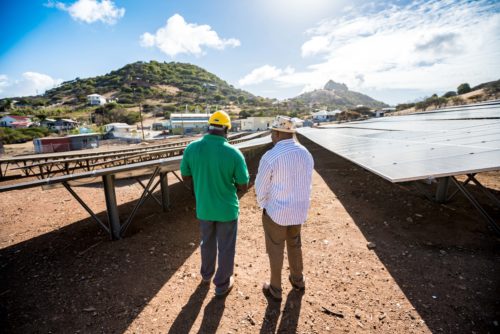
In the early months of 2022, the Caribbean Centre for Renewable Energy and Energy Efficiency’s (CCREEE) Project Preparation Facility (PPF) took off running as its team endeavoured to advance several initiatives in the areas of project development, project origination, and capacity building. From January to March, one of the focal areas of work that emerged was microgrid project development for energy access in remote Caribbean communities.
Electrification rates within the Member States of the Caribbean Community (CARICOM) are generally good. According to the latest World Bank data, CARICOM is 95% electrified. This figure, however, does not negate the fact that 5% or approximately 6.1 million persons in the region live without access to electricity. Most of these persons reside in Haiti. However, outside of Haiti 88,284 people in Belize, Suriname, Guyana, and Grenada live without access to electricity. In this regard, the CCREEE has embarked on an Energy Access Programme (EAP) focused on these five countries.
In line with the Centre’s vision to transform the energy landscape into a climate-resilient, sustainable and affordable sector focused on improving the lives of Caribbean people, the EAP seeks to bring the numerous benefits of electricity access to all people of the Caribbean region. These benefits include improved economic activity, education opportunities, gender equality, climate resilience, sustainable community development, and health.
Working closely with the Centre’s EAP team, the PPF dove into early-stage project development activities for solar PV microgrid projects. Within this process, the PPF team engaged in critical activities such as demand analysis, preliminary technical design, and economic assessment. Additionally, and notably, community and stakeholder engagement at the beginning and throughout these project development steps was found to be critical.
The PPF and EAP teams commenced their joint work by collaborating on a pre-feasibility study for a rural community in southwest Belize. The first step was to collect data to inform the estimation of the village’s energy demand. To ensure the most accurate estimation, the CCREEE team consulted with relevant government and civil society stakeholders who directly contacted the community to glean pertinent information about the village. Based on the information obtained and the estimation produced, the CCREEE team developed a preliminary design of the project and conducted an initial economic assessment based on low and moderate population growth rates. At each stage, stakeholders such as the utility, the ministry with responsibility for rural development, and the ministry with responsibility for energy were contacted to clarify and update any needed data. Continual consultation aids to overcome typical challenges associated with microgrid development in rural areas such as energy systems’ capacity that do not match the needs and interests of the community, unaffordable tariffs, and inability to maintain the energy systems built due to lack of skills transfer.
As the PPF moves forward into the next quarter of the year, its team will continue developing the portfolio of projects through, inter alia, demand analysis, preliminary technical design, economic assessment, regulatory and permitting, risk assessments, and continuous stakeholder engagement. In the coming months, for its microgrid project in Belize, the Centre is looking forward to conducting town hall meetings with the rural village in partnership with the government’s Energy Unit .